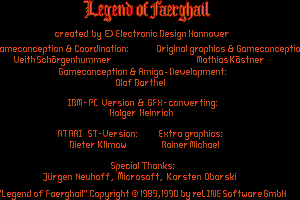

I could delve into other murky waters, like the different tiers of sites and how the publishers treat them, or the whole wonderful world of "embargoes" and how it really screws over the little guys. So, an RPG from an unknown studio is much less likely to get attention than a sequel to a hit franchise. The sheer quantity of games also means that reviewers will sometimes look for reasons not to pay attention to a game unless it's "known" it's going to be a hit. And, if it's not, then the review doesn't really reflect the quality. The most common example is that the game might be a bit rough in pre-release, so the reviewer will assume that bugs will be fixed, performance will be enhanced, etc.
LEGEND OF FAERGHAIL AMIGA CODE
One problem with pre-release code is that some things can change between review and release. It's actually pretty rare that a reviewer will play through a game entirely like a normal player would.

Or, they might give the reviewer a bunch of save games so they can play through the highlights. For consoles, these sites often have developer versions of the consoles to run pre-release code.Īnother common thing is to have the developer demonstrate the game for the reviewer. Many publishers will send pre-release code to reviewers, especially at the bigger sites. You are correct that the accelerated pace of news has sped things up and made things more complicated. I wrote some reviews for a friend's site before, and being a developer I've seen both sides of the fence. Yeah, the world of game reviews is wacky. In almost every way, it undermined its own positive contributions. It had a system by which weapons and armor become damaged but then made it a trivial process to fix them. It offered pocket-picking (and an associated jail system!) but didn't provide enough gold to make it worthwhile. It offered nice graphics for monster portraits and screenshots but screwed up the navigation graphics by not showing items in your periphery and by making every enemy sprite a ghost. It set up an interesting combat system but made it so long that you almost always want to use "quick combat," and it made combat completely optional since every one (except the final, I assume) is escapable. It introduced NPCs who would join the party for specific reasons and then never say anything again. It introduced food as a logistical challenge (and an associated morale system) and then loaded the characters up with so much that I eventually had to drop meals on the floor. It introduced a system by which the characters could learn to speak to every creature in the game, and then made it unnecessary to speak to any of them. It introduced some new classes and made them irrelevant. Unfortunately, almost everything it innovated, it screwed up.


 0 kommentar(er)
0 kommentar(er)
